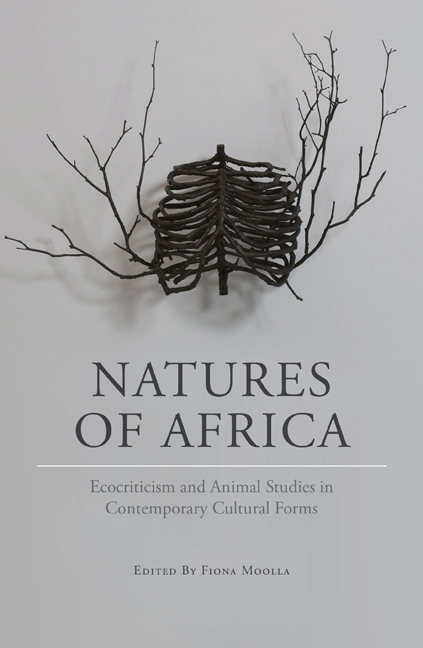Book contents
- Frontmatter
- Table of Contents
- Foreword
- Introduction
- 1 ‘Here is Some Baobab Leaf!’: Sunjata, Foodways and Biopiracy
- 2 Shona as a Land-Based Nature-Culture: A Study of the (Re)Construction of Shona Land Mythology in Popular Songs
- 3 The Environment as Significant Other: The Green Nature of Shona Indigenous Religion
- 4 Animal Oral Praise Poetry and the Samburu Desire to Survive
- 5 The Paradoxes of Voluntourism: Strategic Visual Tropes of the Natural on South African Voluntourism Websites
- 6 Towards an Ecocriticism in Africa: Literary Aesthetics in African Environmental Literature
- 7 Critical Intersections: Ecocriticism, Globalised Cities and African Narrative, with a Focus on K. Sello Duiker's Thirteen Cents
- 8 Navigating Gariep Country: Writing Nature-Culture in Borderline by William Dicey
- 9 Negotiating Identity in a Vanishing Geography: Home, Environment and Displacement in Helon Habila's Oil on Water
- 10 Human Masks? Animal Narrators in Patrice Nganang's Dog Days: An Animal Chronicle and Alain Mabanckou's Memoirs of a Porcupine
- 11 Nature, Animism and Humanity in Anglophone Nigerian Poetry
- 12 Animals, Nostalgia and Zimbabwe's Rural Landscape in the Poetry of Chenjerai Hove and Musaemura Zimunya
- About the authors
- Acknowledgements
- Notes
- Index
6 - Towards an Ecocriticism in Africa: Literary Aesthetics in African Environmental Literature
Published online by Cambridge University Press: 10 May 2018
- Frontmatter
- Table of Contents
- Foreword
- Introduction
- 1 ‘Here is Some Baobab Leaf!’: Sunjata, Foodways and Biopiracy
- 2 Shona as a Land-Based Nature-Culture: A Study of the (Re)Construction of Shona Land Mythology in Popular Songs
- 3 The Environment as Significant Other: The Green Nature of Shona Indigenous Religion
- 4 Animal Oral Praise Poetry and the Samburu Desire to Survive
- 5 The Paradoxes of Voluntourism: Strategic Visual Tropes of the Natural on South African Voluntourism Websites
- 6 Towards an Ecocriticism in Africa: Literary Aesthetics in African Environmental Literature
- 7 Critical Intersections: Ecocriticism, Globalised Cities and African Narrative, with a Focus on K. Sello Duiker's Thirteen Cents
- 8 Navigating Gariep Country: Writing Nature-Culture in Borderline by William Dicey
- 9 Negotiating Identity in a Vanishing Geography: Home, Environment and Displacement in Helon Habila's Oil on Water
- 10 Human Masks? Animal Narrators in Patrice Nganang's Dog Days: An Animal Chronicle and Alain Mabanckou's Memoirs of a Porcupine
- 11 Nature, Animism and Humanity in Anglophone Nigerian Poetry
- 12 Animals, Nostalgia and Zimbabwe's Rural Landscape in the Poetry of Chenjerai Hove and Musaemura Zimunya
- About the authors
- Acknowledgements
- Notes
- Index
Summary
What is African environmental literature? What environmental issues are revealed in African literature? How do African authors represent African environments? Chinua Achebe's (1959) Things Fall Apart, a classic of African literature, for example, has been read and studied as an African postcolonial novel that aims to reconstruct precolonial African cultural identity in general and traditional Igbo cultural identity in particular. However, this novel can also be read as an environmental novel. In ‘Things Fall Apart fifty years after: An ecocritical reading’, Nchoujie Augustine (2009) foregrounds Achebe's environmental consciousness by examining ‘the ecological component’ (Augustine 2009: 107) that Achebe integrates into his writing, such as the imageries of the African forest, especially the forest's influence on the sustainability of the Igbo community, as well as its correlation with Igbo customs. Elizabeth M. DeLoughrey and George B. Handley, in their introduction to Postcolonial Ecologies: Literatures of the Environment (2011), argue that the ‘narrative shift’ (DeLoughrey and Handley 2011: 7) of Achebe's novel from an oral, Igbo-centred narrative (as revealed in the first two parts of the novel) to a written, colonial-dominated narrative (as revealed by the district commissioner's book, The Pacification of the Primitive Tribes of Lower Niger in the last part of the novel) suggests the author's critique of the environmental transformation in Igboland caused by European colonisation.
As DeLoughrey and Handley (2011: 6) state, ‘Chinua Achebe emphasized the radical ontological shift in understanding place that occurred through the process of European colonialism and Christian missionisation in his 1958 novel Things Fall Apart.’ In my essay ‘From cultural hybridization to ecological degradation: The forest in Chinua Achebe's Things Fall Apart and Ben Okri's The Famished Road’, I argue that Achebe represents the indigenous Igbo relationship with the land and the earth goddess (Ani) – a relationship between ancestral spirits, gods, use of the land, harvest and community sustainability – in order to critique how the advent of British colonialism undermines that relationship. These recent environmental readings of Achebe's novel remind us that to understand environmental issues in the context of the Igbo society represented by Achebe, we need to understand not only the physical environment of Igboland, but also the Igbo people's relationship with it through spiritual and social practices. Achebe's novel therefore represents traditional Igbo cultural life as intertwined with environmental concerns that are also necessarily social.
- Type
- Chapter
- Information
- Natures of AfricaEcocriticism and Animal Studies in Contemporary Cultural Forms, pp. 141 - 165Publisher: Wits University PressPrint publication year: 2016



